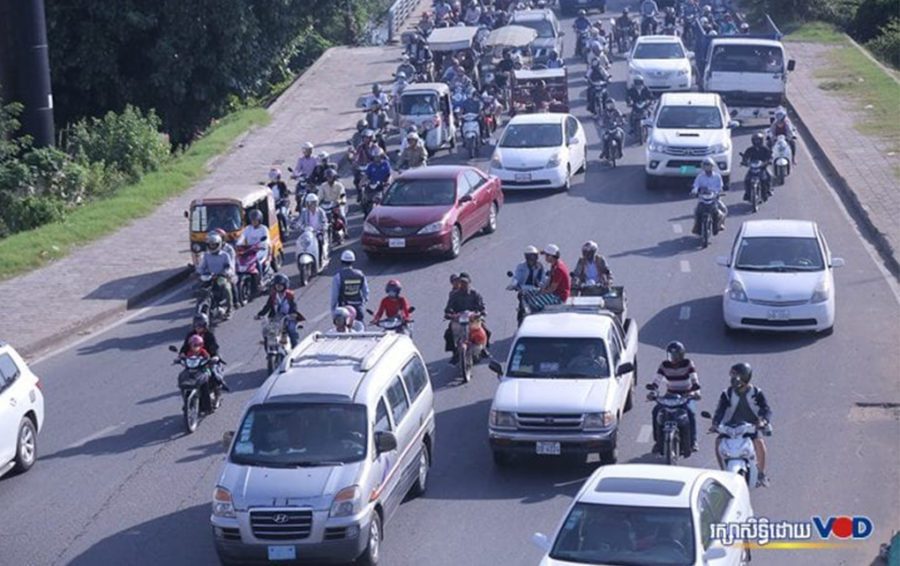The government has announced plans to slap traffic law violators with higher fines — regardless of drivers’ status — in an effort to limit roadway deaths and damage, but a road safety advocate cautions that fines alone will not prevent accidents.
In a speech in Kandal province on Wednesday, Interior Minister Sar Kheng said 2020 would be the year to implement the law, adding that traffic regulations would be enforced for all drivers, no matter who they are.
“If we only apply [the rules] to ordinary people, but we don’t apply to those with [prominent] names and wealth who commit crimes, this will not improve,” Kheng said.
He called on officials to encourage people to follow traffic laws when driving, and follow the rules themselves.
Officials had already studied a sub-decree pertaining to the raised traffic fines and would submit proposed amendments to Prime Minister Hun Sen for review, Kheng said.
In January, the minister declared the nation’s rise in road casualties an “emergency.” Traffic deaths last year increased by 12 percent, or an additional 220 people killed, and injuries rose by 29 percent, or 1,371 more people hurt compared to 2018.
Between five and six people die on the nation’s roadways each day, and another 15 are injured, Transport Minister Sun Chanthol said at a press conference earlier this year.
Road accidents cost about $350 million from the national budget annually, according to Chanthol, who suggested that the government could build more schools and infrastructure if it could reduce the cost.
Tey Visal, deputy director of the Interior Ministry’s traffic and public order department, on Wednesday said he was in a meeting discussing changes to the traffic sub-decree and declined to comment.
Transport Ministry spokesman Pal Chandara could not be reached, but he told the Phnom Penh Post this week that the draft sub-decree amendments, pending minor changes and an official announcement, would raise fines to three to four times the current amount.
If approved, current fines of 15,000 riel ($3.75) for not wearing a helmet would be raised to 50,000 riel, and fines of up to 20,000 riel would be tripled, Chandara said.
“Higher fines will compel our citizens to comply with the law. They should not fear the police but the law. It’s not about the fines, but saving lives,” he told the Post.
While higher fines may make some drivers change their behavior, and help reduce the frequency of crashes, Kong Ratanak, director for the Institute for Road Safety, expressed concern that wealthy and powerful drivers were not moved by fines. He noted that high-ranking law enforcement officers may sometimes step in and waive fines for those they see as powerful.
“I would like to ask competent officials to work and tighten up their transparency and accountability to the law. Then I believe effective [enforcement] will follow,” Ratanak said.
Higher fines would have a greater impact on low-income and provincial drivers, and the old fine rates sent the same message, as long as they were enforced, he said.
“What has been done to reduce traffic accidents is a good thing, but I am worried about the reaction from [poor] people in relation to the size of the high fine, which is hard for them to accept,” he said.
Ratanak suggested the government encourage better road safety education instead of increasing fines.
The government, for example, could require drivers of motorbikes with engines of 125cc or below to take a driving test and get a license, which is not currently required, but Ratanak said could improve road safety knowledge.
Police reports showed that traffic accidents are mostly caused by drunk driving and drivers who are either unaware or disrespectful of the law. Motorbike drivers are especially vulnerable to accidents, making up 80 percent of deaths on the road, according to Ratanak.
Last week, Sar Kheng, who is also a deputy prime minister, said more than 28 percent of accidents nationwide happened in Phnom Penh last year, or 1,170 in the capital, far outnumbering accidents occurring in any one province.
The minister said that the government had been lenient with drivers in the past, but would focus on enforcing the law as a method of education. Kheng said that traffic police officers were already educating motorbike drivers who aren’t wearing a helmet and asking them to get one.
“The traffic police have to strictly implement the traffic law without tolerance or exception,” he said.













